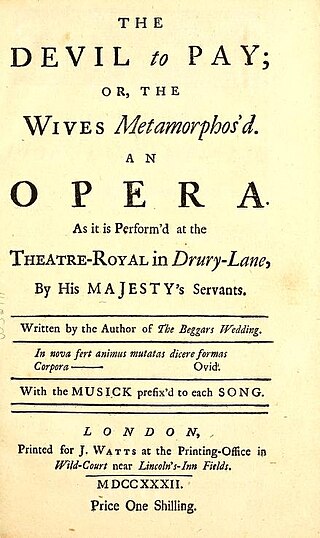
The Tragedy of Lady Jane Grey, often shortened to Lady Jane Grey, is a 1715 tragedy by the British writer Nicholas Rowe. It portrays the brief reign of Lady Jane Grey, a pretender to the English throne following the death of Edward VI and her defeat and execution by Mary I in 1554. The title role was played by the prominent actress Anne Oldfield. The cast also included John Mills as the Duke of Northumberland, Barton Booth as Lord Guilford Dudley and Lacy Ryan as the Earl of Sussex, Colley Cibber as Bishop Gardiner, James Quin as the Lieutenant of the Tower and Mary Porter as the Duchess of Suffolk.

The Spartan Dame is a 1719 tragedy by the Irish writer Thomas Southerne. It was inspired by a story from Plutarch's Life of Aegis and was originally written as early 1687, but faced a long period of censorship and revision. The Drury Lane managers chose to revive it at a time of tension with the Stanhope-led government Whigs over licensing issues, and may have selected it because its plot subtly allowed them to demonstrate sympathy with the opposition Whigs led by Robert Walpole following the recent Whig Split.
The Play is the Plot is a 1718 comedy play by the British writer John Durant Breval.
Humphrey, Duke of Gloucester is a 1723 tragedy by the British writer Ambrose Philips. It is based on the life of Humphrey, Duke of Gloucester, youngest brother of Henry V.
Caelia, or, The Perjur'd Lover is a 1732 comedy play by the British writer Charles Johnson. The play's epilogue was written by Henry Fielding.

The Refusal, Or, The Ladies Philosophy is a 1721 comedy play by the British writer Colley Cibber. It is a reworking of the 1672 farce Les Femmes Savantes by Molière, with reference to the recent South Sea Bubble.
Caesar in Egypt is a 1724 tragedy by the British writer Colley Cibber. It is inspired by Pierre Corneille's 1642 French play The Death of Pompey about Julius Caesar's intervention in the Egyptian Civil War between Cleopatra and her brother. Cibber also incorporated elements of Plutarch and John Fletcher's The False One. The Drury Lane company invested lots of resources to make it a particularly extravagant production in the traditional style of a Restoration heroic drama.
The Modish Couple is a 1732 comedy play by the British writer James Miller, under the pen name Charles Boaden. A virtuous wife reforms her rakish husband.

The Provoked Husband is a 1728 comedy play by the British writer and actor Colley Cibber, based on a fragment of play written by John Vanbrugh. It is also known by the longer title The Provok'd Husband: or, a Journey to London.

The Devil to Pay is a 1731 ballad opera by the Irish writer Charles Coffey and British writer John Mottley. Also known by the longer title The Devil to Pay: Or, The Wives Metamorphos'd, it was part of a group of ballad operas produced in the wake of the success of John Gay's The Beggar's Opera. The work is inspired by Thomas Jevon's 1686 play The Devil of a Wife.
Bayes's Opera is a 1730 ballad opera by the British writer Gabriel Odingsells. It was part of a boom in ballad operas that followed in the wake of the success of John Gay's The Beggar's Opera.
The Rival Modes is a 1727 comedy play by the British writer James Moore Smythe.
Love in a Forest is a 1723 comedy play by Charles Johnson. It is a substantial reworking of Shakespeare's As You Like It cutting out characters and passages, while borrowing from other Shakespeare plays amongst other things.
The False Friend is a 1702 comedy play by the English writer John Vanbrugh. It was inspired by Francisco de Rojas Zorrilla's Spanish play La traición busca el castigo.

She Would and She Would Not is a 1702 comedy play by the English actor-writer Colley Cibber.
The Bath; or, The Western Lass is a 1701 comedy play by the English writer Thomas d'Urfey.
The Victim is a 1714 tragedy by the British writer Charles Johnson.

The Double Gallant, or the Sick Lady's Cure is a 1707 comedy play by the British writer Colley Cibber.

The Rival Fools is a 1709 comedy play by the British writer Colley Cibber. It drew inspiration from the earlier play Wit at Several Weapons. Despite Cibber's previous record of turning out hits, it was not a great success.
The Lying Lover; Or, The Lady's Friendship is a 1703 comedy play by the Irish writer Richard Steele. It was his second play, written while he was an army office doing garrison duty in Harwich during the War of the Spanish Succession. It is described as being both a restoration comedy and a sentimental comedy, and marked the transition between the two.









